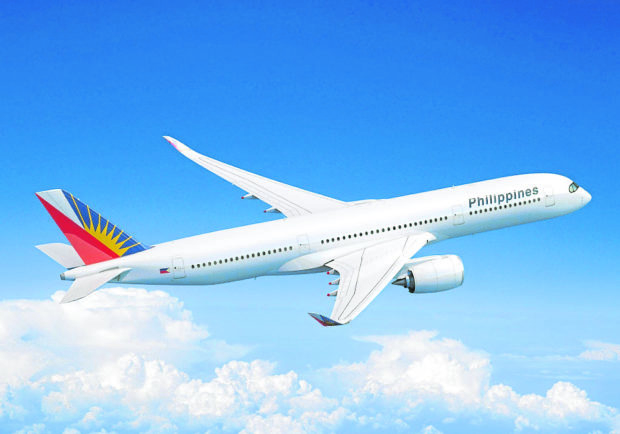PAL reduces business seats, ditches premium economy

Airbus was tapped to reconfigure 15 of PAL’s narrow and widebody planes. An A350, pictured here, will add 18 seats for a total of 313 seats. —Photo from Airbus
Taipan Lucio Tan’s Philippine Airlines (PAL) will jettison premium economy and reduce business class seats under a new strategy aimed at increasing its viability.
This will allow PAL to squeeze in more economy seating, helping the flag carrier to “better adapt to changing market situations,” Nilo Thaddeus Rodriguez, PAL chief financial officer, said in a statement released by European aerospace company Airbus.
Airbus was tapped to reconfigure 15 of PAL’s narrow and widebody planes, according to the statement. The cabin modification agreement covers 11 A320s, two A330-300s and two A350-900s.
According to Airbus, the A320s will increase seating capacity by 15 percent, or 24 extra seats for a total of 180 seats.
The A330s will get an additional 16-percent capacity, or another 50 seats to 359 seats, while the A350 will add 18 seats for a total of 313 seats.
There were no details on how many business class seats would be retained on the A320s and A330s.
Airbus noted that business class and economy would be retained in the A350s. The company made no mention of the aircraft’s premium economy cabin, a middle-market offering with better food and leg room.
After debt reduction
According to Airbus, this was part of PAL’s “fleet restructuring plans.”
“Our aircraft deployment decisions and related technical support arrangements are tailored for a restructured network that suits a vastly different global environment,” Rodriguez said in the statement.
The announcement came in the wake of PAL’s exit from US Chapter 11 bankruptcy, where the carrier successfully negotiated the reduction of $2.1 billion in aircraft-related debts.
PAL also committed to a new business strategy, which involved returning over 20 planes to bring its fleet size to 70 aircraft and cancel unprofitable ultra long-haul routes, which may include London and the North American East Coast.
PAL management earlier told the Chapter 11 court it could return to profitability as early as 2022.
Based on its projections, revenues this year would reach $2.1 billion, going up to $2.46 billion in 2023 and $2.59 billion in 2024.
It also forecast a net income of $145 million in 2022, $312 million in 2023 and $379 million in 2024.
FHS extension
Meanwhile, Airbus said PAL extended its so-called Flight Hour Services’ (FHS) material program to cover more of its fleet.
The FHS program, which previously covered two A350s, now includes 37 more planes. These comprise 29 A321s (including eight A321neos) and eight A330ceos.
“Airbus has its customers’ interests at heart and works closely with them to propose flexible material solutions that meet their needs,” Anand Stanley, president at Airbus Asia-Pacific, said in the statement.
“We are pleased that PAL recognizes the significant savings and operational performance which Airbus can bring with FHS, extending the current arrangement to their A330 and A321 Family fleets,” he added.
Disclaimer: The comments uploaded on this site do not necessarily represent or reflect the views of management and owner of Cebudailynews. We reserve the right to exclude comments that we deem to be inconsistent with our editorial standards.
